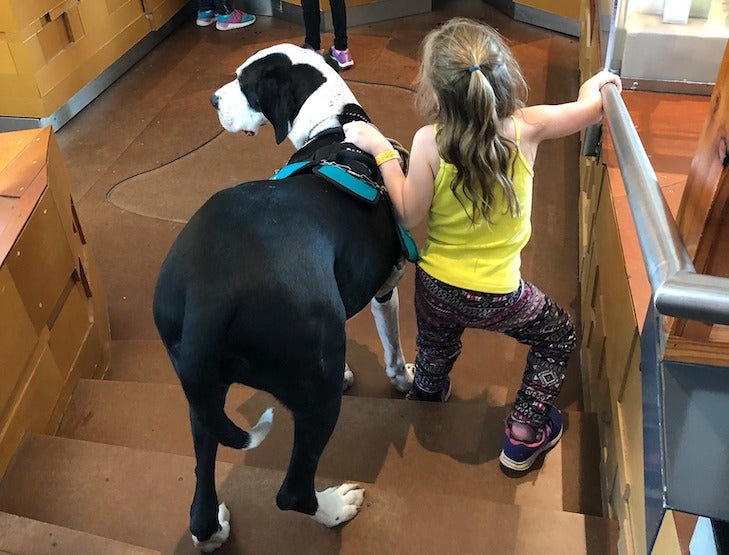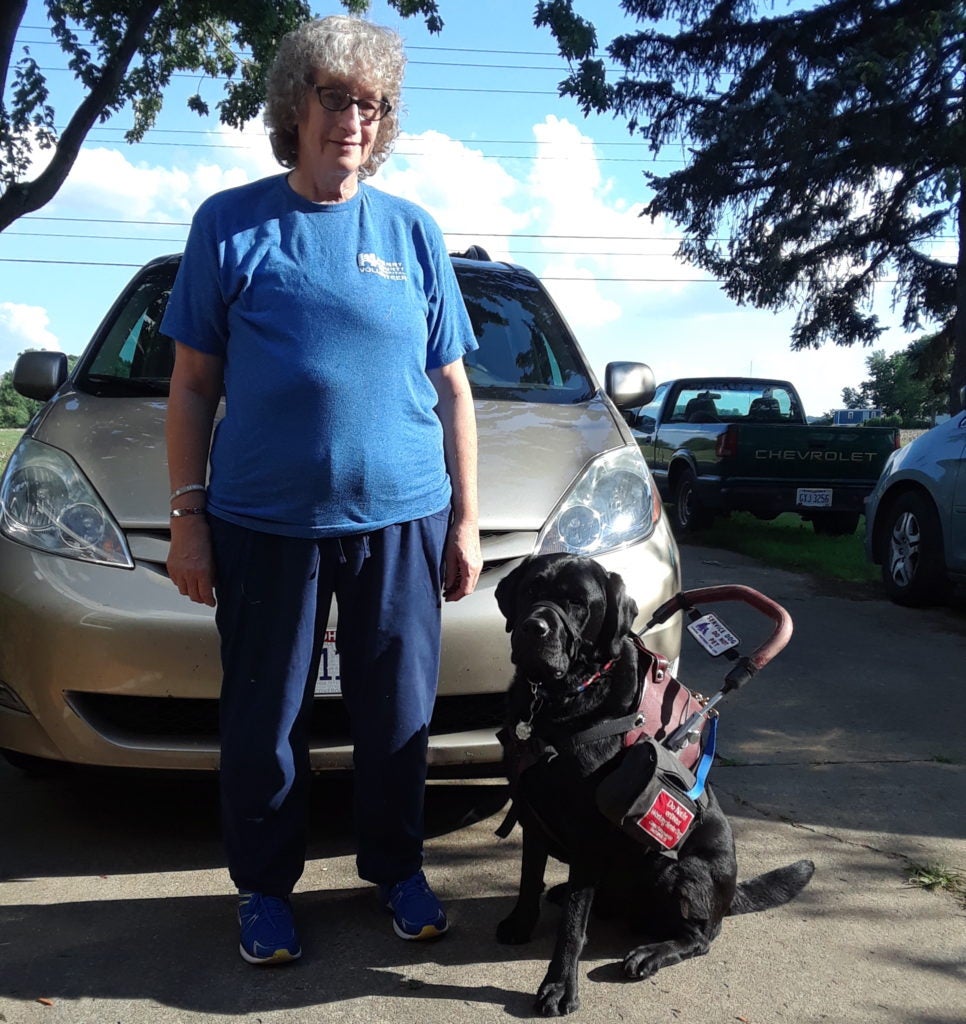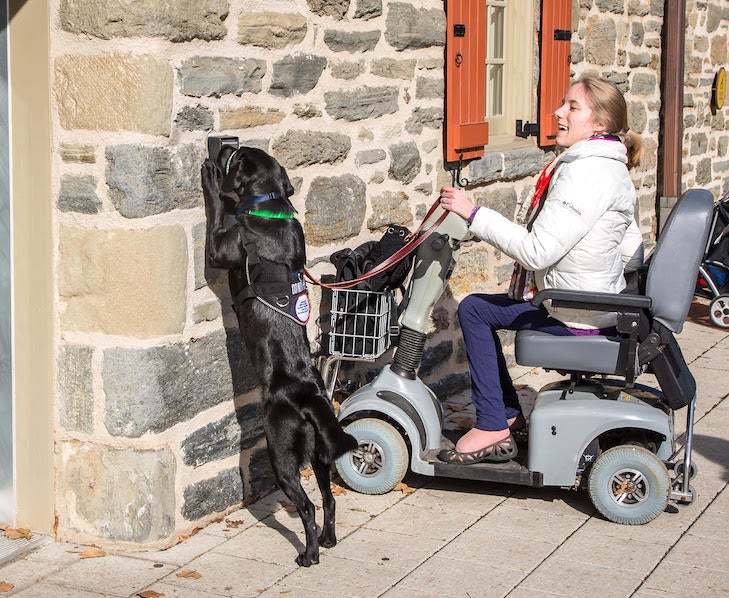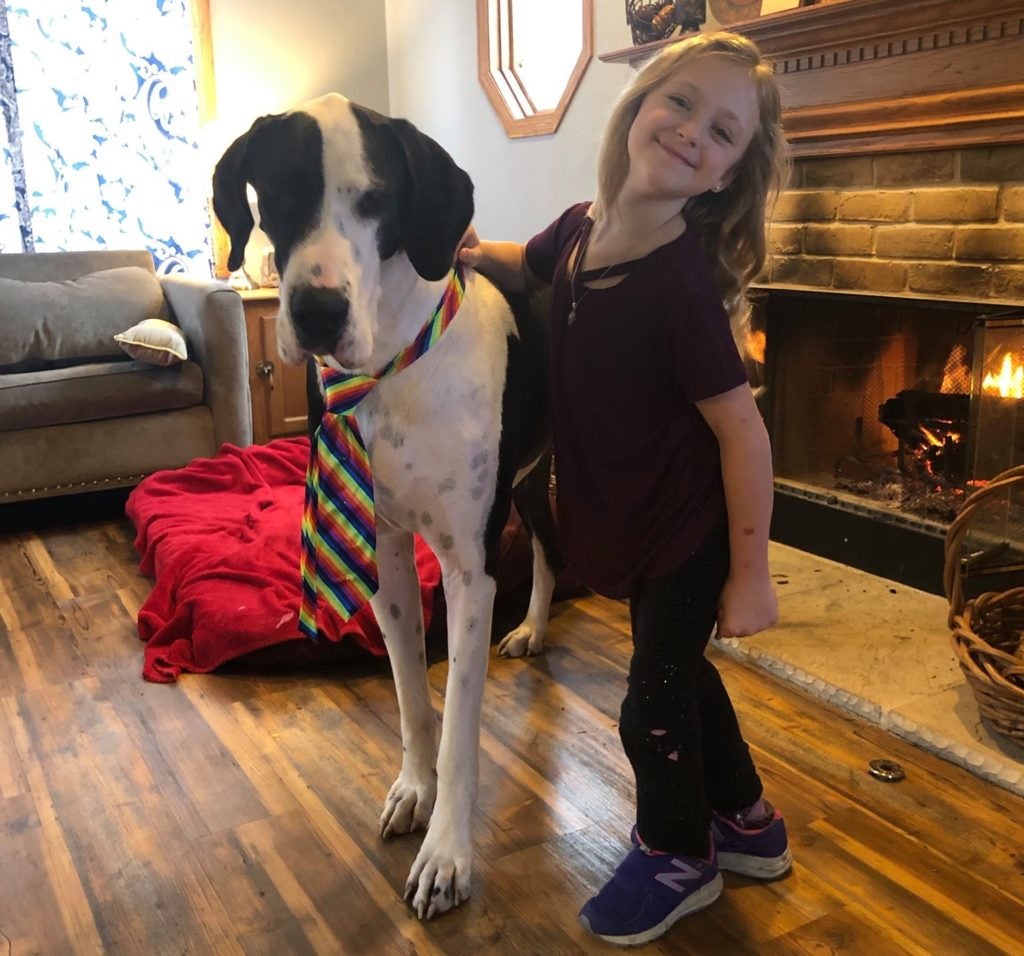
Every day, specially trained mobility service dogs help people with balance, strength, or moveability issues live a happy, independent, and fulfilling life.
What Do Mobility Service Dogs Do?
Mobility service dogs can be trained to perform a variety of tasks, including:
- Pressing the button on automatic doors
- Retrieving dropped items
- Retrieving out-of-reach objects (like a ringing phone)
- Being a brace for people who suffer from balance or strength issues
These remarkable dogs are truly special. Here are the stories of three dogs with jobs who are making a difference for people of all ages.
Denise and Axle
Denise Etzler’s life has changed thanks to Axle, a black Labrador Retriever. Axle is a service dog provided to Etzler by Canine Partners for Life (CPL). CPL trains dogs to meet specific individuals’ needs, so they can increase their independence and quality of life. Recipients raise money to help fund their dog and attend special training classes once the right match is found.
Ever since Axle came into her life, Etzler says, everything has changed. “When you meet me today, you meet a woman who is strong and confident, a woman who volunteers in my community seven days a week, a woman who is independent,” she explains. “Three years ago, I was a very different woman. I faced a variety of health issues, both physical and emotional.”
The muscles in her legs were deteriorating, so she needed a walker at home and an electric powerchair when she traveled. She had migraines and worried about going anywhere alone. She chose CPL because they provide service dogs to homes that have other pets. She filled out an application, attended an interview about her needs, and was then placed on a waiting list.
“CPL spends approximately $30,000 to train each dog,” Etzler says. “It requests that each family contributes financially when a match is made. My family and my church congregation held fundraisers to help me raise money to help me meet this goal.”

Finally, after two years, she got a phone call in July 2016. They found her a dog: Axle, a two-year-old lab. She came to CPL for a three-week training with Axle in October 2016, when he finally came home with her.
“Within just a few short weeks, Axle opened up a new world to me,” she says.
Axle helps her walk short distances in the home without a walker and assists her with getting out of chairs and off the floor. He retrieves items that she drops, helps her navigate stairs, and opens doors. He also carries bags and can open cupboards and refrigerator doors with a tug rope.
“Because of his training, Axle goes into restaurants with me,” Etzler says. “He has flown to San Diego with me to visit family, riding with me under my seat.”
Because of Axle’s special skills, he also alerts her (with 90% success) before she has a migraine and leans against her if her blood pressure drops to keep her from falling.
“I’ve gone from being home 24/7 to being an important part of my community,” Etzler says. “I teach Sunday School and lead adult Bible studies. I volunteer four days a week for a nonprofit and help cook weekly meals at my church. Thanks to Axle’s support and companionship, my anxiety has decreased significantly. I have been able to go off half of my daily medications. I do our weekly grocery shopping and I volunteer weekly at our local county hospital. In short, Axle has restored my independence.”
Katelyn and Kiwi
Katelyn Batson lives with spinal muscular atrophy, a form of muscular dystrophy. She found Kiwi, a Labrador Retriever, thanks to CPL, when she applied for a service dog in 2016.
“I knew a service dog would help me be more independent,” Batson says. “I never could have imagined, though, the beautiful impact that Kiwi has had on every facet of my life.”
Batson says that Kiwi performs many tasks for her, like picking up things even as small as a penny, carrying bags, taking off her jacket, touching handicapped door buttons, and more. Kiwi can even help Batson find someone to help if she’s fallen.

“Kiwi has taken a significant amount of stress out of my life,” Batson says. “I know I’m never alone, and she can take care of all the little things that I used to be so concerned about.”
But their partnership goes beyond just helping with daily tasks. “One of the greatest parts has been how others relate to me as a disabled person,” Batson says. “Before Kiwi, I was used to people, especially children, staring at me in my wheelchair and sometimes looking like they were afraid. Now, children definitely stare, but they are so, so excited. Every day, Kiwi helps break down the barrier that my wheelchair often makes. Thanks to her, joy and curiosity replace fear and uncertainty when strangers see someone different than them. Kiwi devotes her life to helping me, but she really helps so many others too.”
Eve and Finn
Eleven-year-old Eve Dahl lives with osteogenesis imperfecta (brittle bone disease), which makes walking difficult. She can’t use a walker correctly because her lower arms are weak, forcing her to lean on her elbows. Enter Finn, a Great Dane from the Service Dog Project. He’s changed Eve’s life ever since he was brought home in January 2017. In September, Finn will be four.

“Finn has been amazing to have,” says Eve’s mom, Deb Dahl. “He has helped Eve to do things she could never do independently without him!”
Prior to getting Finn, Eve had to use a wheelchair in public because she was safer there. And she’s so small for her age that people often didn’t see her and just bumped into her.
“Before Finn, I would frequently get people’s attention before they would walk into her chair,” Deb says. “With Finn by her side, Eve is not overlooked, ever! Just his presence keeps her safe.”
Deb says that her daughter also lives with Tourette Syndrome, and Finn helps keep her calm. “Finn definitely has a calming effect on her just by nature, and he has made big improvements to her ability to sleep with him by her side,” she says.
Thanks to Finn, Eve can stay on her feet longer, she’s building endurance, and he can help her get to places that aren’t wheelchair accessible.
“Recently, there was an event at our library that Eve wanted to do,” Deb sats. “When we got there, we found out it was in the basement and there was no elevator. No sixth grader wants to be carried by Mom into a room of their peers! But Finn was there to save the day and my back. With his help, she could walk down the stairs on her own.”
Mobility service dogs are amazing companions who help people of all ages find independence and confidence again. These smart, talented dogs have jobs that are truly making a positive difference in the world.

